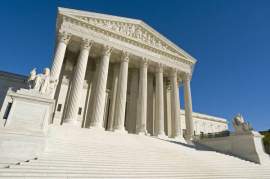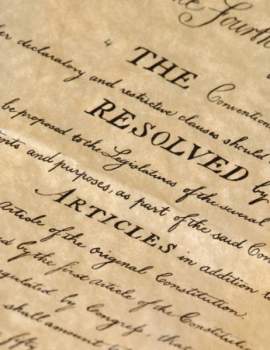
Major Decisions-Roe v Wade

Popular In Constitution
Purpose Of Lifetime Appointment And Pros And Cons Enumerated Powers Bicameral Legislature Background Article 3 Of The Constitution We The People 1st Amendment Who Wrote The Constitution Judicial Review Equal Protection Clause 5th Amendment 10th Amendment Three Fifths Compromise
The Roe v. Wade case would prove to be one of the most controversial cases ever tried by the Supreme Court. The implications leading to the Supreme Court case itself, as well as the immediate aftereffects, are ones that are still being debated today by numerous factions.
The main issue disputed in Roe v. Wade was women's rights to an abortion. At the time, several states had restrictions considering abortion, ranging from the overall ban of the practice to allowing abortion through approval of a medical panel. Furthermore, it would be the opposition of several religious factions that would lend for more controversy to the issue, specifically when the Supreme Court rendered a decision in favor of allowing abortion to be a legal practice.
Roe v. Wade would become the landmark United States Supreme Court
decision on the issue of abortion. Even though the courts would render abortion
a legal practice, they also implemented certain restrictions, such as the right
to abortion being limited depending the stage of pregnancy. Additionally, the
courts provided for a viability clause, which was defined as the fetus'
potential for survival outside of the womb of the mother, even if artificial
aid is to be implemented. Medically speaking, viability occurs at about the
seventh month of pregnancy. However, it can occur beforehand.
Roe v. Wade would have Constitutional implications on several
levels. Firstly, those using the Constitution in opposition to abortion rights
cited that there was no implicit provision regarding the issue in the
Constitution. Because of this reason, many believed that such a right should be
within the power of the states to resolve and decide to implement. Chief
Justice Warren E. Burger, however, would delve into Constitutional law further
by examining its contained provisions, and thus, being able to confirm the
decision to grant the right to abortion within the scope of Constitutional
laws.
The Supreme Court would rule that abortion was a fundamental right provided by the United States Constitution. Initially, the decision was based upon the Constitution's Ninth Amendment. It was argued that the Ninth Amendment rights granted to the people would encompass a woman's decision to have an abortion under the interpretation that the Ninth Amendment would protect inferred rights not specifically enumerated by the Constitution.
However, it would be the
Fourteenth Amendment that would be more applicable
in the case for further protecting the right to privacy based on the
Constitution’s Due Process Clause. It was also ascertained that abortion rights
were protected by the Bill of Rights as a whole, wherever provisions
to the right of privacy, such as marital, familial, and sexual matters are
discussed.
The Judges' majority decision on Roe v. Wade itself proves to
exhibit how complicated the case actually was, for it was divided into twelve
sections plus a preface, which include all of the considerations that were evaluated
to render the decision in favor of Roe. One of the most important clauses contained
therein would be the Justices’ application of the Constitution without having
implemented any particular sentiment or emotion regarding the case regardless
of personal views. They would apply the Constitution without any reservation,
regardless of the outcome of the decision.
The majority opinion also
states that the decision would also be applied in concurrence with medical
views and history, for abortion was not just a legal issue, but a health issue.
Overall, the judges would conclude that the purpose of the Constitution was not
to evaluate conflicting issues or ideals, but rather to provide for rights and
regulations the commonwealth could agree upon to govern the country as a whole.
It is without a doubt that the final decision of the Supreme Court
in Roe v. Wade would end in controversy and such disputes are still encountered
today, with various grassroots movements existing that oppose abortion, as well
as religious entities stating their beliefs on the matter.
Those that support abortion rights have gone so far as citing the Thirteenth Amendment, claiming that denying abortion rights would compel a woman to forcefully bear a child and undergo pregnancy, which can be considered "involuntary servitude". Even though this argument has not necessarily been evaluated in terms of Constitutionality, it proves to be yet another viewpoint that uses Constitutional law against abortion bans.
NEXT: Major Decisions-Texas v. Johnson





















